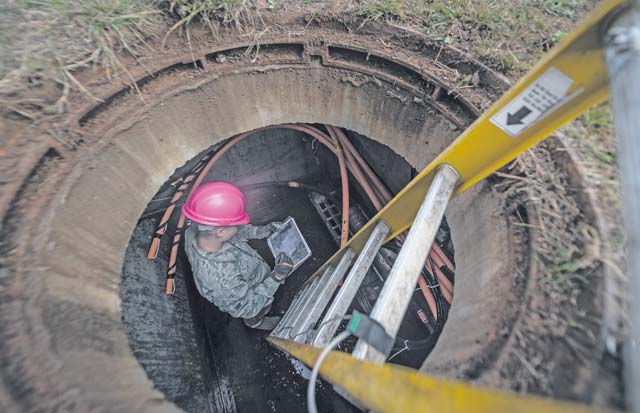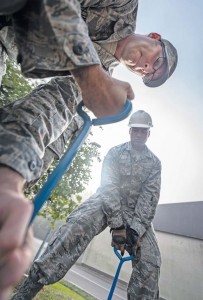
Trucks, high pressure hoses, engines, ladders, hard hats and a station dog are all essential tools to put out a fire, even those that don’t burn.
The Kaiserslautern area has more than 50,000 American citizens living within its boundaries, and keeping the military chain of communications open depends on Airmen affectionately called “Cable Dawgs.”
A vast infrastructure comprising antennas and manholes provides the communication backbone for the KMC. Airmen such as Airman 1st Class Dillon Fowler and Senior Airman Joshua Cruz, 86th Communications Squadron cable and antenna maintenance specialists, are responsible for climbing these metal monsters and diving into the depths under the streets to tackle the jobs that keep the stream of information flowing.

“We provide a path of communication,” Cruz said. “All over base you’ll find (communication nodes) containing all sorts of cables necessary for interconnectivity. We maintain, replace and install these to ensure communication stay up throughout the KMC.”
Many Cable Dawgs have the opportunity to work hands-on in varying situations. Depending on the location and season, working inside a manhole or on top of an antenna may require extra security precautions.
“We have to be prepared for many precarious situations,” said Staff Sgt. Aaron Kline, 86th CS cable systems crew chief. “Oftentimes we will find manholes filled with water, which can be full of lethal and combustible gasses as well.”
Cruz said maintaining the KMC’s system of cables can be challenging, but it’s never mundane or repetitive.
“There are a lot of interesting opportunities we find ourselves in,” Cruz said. “I’ve climbed 90 plus feet into the air and then walked 15 plus feet out on an antenna arm for a quick repair. It’s all part of what we do.”
Occasionally, there is confusion on what these Airmen can accomplish. Though they might install and maintain a colossal amount of communication infrastructure, they don’t make email quicker.
“It’s funny sometimes,” Fowler said. “When people do see us they usually ask if we can fix their computers or make their Internet better.”
Even though Internet strength isn’t something their shop handles directly, they do provide a pivotal role in establishing it.
“Within three days we’ve set up and installed a whole network inside a four-story building,” Fowler said. “We’re kind of like ghosts; we can get anywhere, and people rarely see us.”
Their job isn’t usually highly visible, their fires don’t burn bright into the night, and many might mistake why they have to dive into the depths below the surface streets, however their responsibilities are just one more critical link that keeps Ramstein and its communications flowing.


